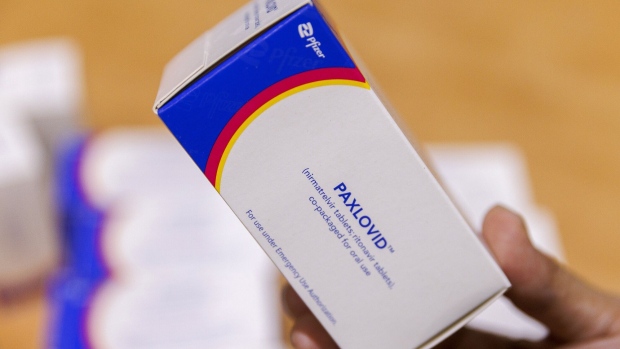Nov 14, 2023
Covid Rebound Hits 1 in 5 Paxlovid-Treated People in Small Study
, Bloomberg News

(Bloomberg) -- Pfizer Inc.’s Paxlovid was linked to a high rate of Covid rebound in a small study that suggests people taking the pill, along with their families and close contacts, should be on the lookout for a return to infectiousness.
About one in five people who received a standard five-day course of Paxlovid saw infectious levels of Covid virus return, compared with about 2% of those who didn’t take the drug, according to the study that involved frequent testing of 127 patients.
The results add to the evidence that Covid rebound is far more common after Paxlovid treatment than the roughly 2% rate that Pfizer found in its trials of the drug. While it’s the most effective Covid treatment with well established benefits, “strategies to prevent or mitigate the potential risk for rebound-associated transmission should be considered,” the researchers said in the study published Tuesday in the Annals of Internal Medicine journal.
The findings back up other small studies that found high rates of rebound after drug treatment, including one where 3 of 11 treated patients saw symptoms return. But symptoms alone shouldn’t be counted on to indicate renewed infectiousness, the authors of the Annals study said; less than half the patients who had viral rebound after Paxlovid saw their symptoms return.
Read More: Pfizer Cuts Guidance as Demand for Paxlovid Pills Dries Up
Pfizer believes that viral rebound is relatively uncommon and not uniquely associated with any specific treatment, a spokesperson said in an email, pointing to other studies that showed rebound was less frequent. The company remains “very confident in Paxlovid’s clinical effectiveness at preventing severe outcomes from Covid-19 in patients at increased risk,” the email said.
Tuesday’s study looked at patients repeatedly, three times a week, according to Mark Siedner, the infectious disease specialist at Massachusetts General Hospital in Boston who led it, more frequently than Pfizer’s earlier trial.
“We think this is the main reason for the difference between our study and the prior clinical trial,” he said in a video that accompanied the publication.
The study was observational and patients weren’t randomly chosen to receive treatment. Reflecting real-world patterns, most of the patients in the study who got Paxlovid were older and high-risk individuals, while younger, healthier people were less likely to get the drug.
Covid testing five days after Paxlovid therapy may help identify those who might be infectious, the authors said. More studies might show whether longer treatment might prevent rebound, the authors said.
©2023 Bloomberg L.P.


